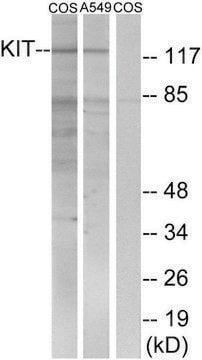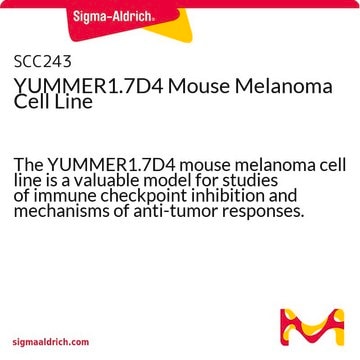SCC227
YUMM1.7D4 Mouse Melanoma Cell Line
Iniciar sesiónpara Ver la Fijación de precios por contrato y de la organización
About This Item
Código UNSPSC:
41106514
eCl@ss:
32011203
NACRES:
NA.45
Productos recomendados
descripción
Cell line type: Cancer Cells
técnicas
cell culture | mammalian: suitable
Descripción general
Source: The YUMM1.7D4 mouse melanoma cell line is a diploid clone derived from the YUMM1.7 cell line, which originated from a 4-hydroxytamoxifen-induced melanoma tumor in a male C57/B1/6 mouse into which mutations from the Braf/Pten genetically-engineered mouse model had been introduced via backcrossing. The YUMM1.7D4 cell line harbors the Braf V600E mutation and is homozygous negative for wild-type Pten and Cdkn2 (1).
The great promise of immune-based therapies in cancer and recent progress in successful application of these approaches has brought to the fore the necessity of immune-competent models to evaluate immune system responses to cancer cells. Immunocompetent genetically-engineered mouse models harboring discrete genetic drivers of melanoma are essential for studying potential immunotherapies but are limited by the need to maintain colonies of multiple genotypes necessary to generate mouse models with appropriate genetic backgrounds.
The YUMM1.7D4 mouse melanoma cell line is a diploid clone of the YUMM1.7 cell line, developed as an immunocompetent cell line that recapitulates genetic drivers found in a significant proportion of human melanomas (1). The diploid genotype of YUMM1.7D4 cells greatly enhances efficiency of CRISPR-based screens with higher frequency of biallelic knockout compared to tetraploid cells. YUMM1.7D4 is syngeneic with the immunocompetent C57/B1/6 mouse background, retaining genetic markers of the Braf/Pten mouse model in which melanoma tumors develop with short latency (2). The genetic tractability of the YUMM1.7D4 mouse melanoma cell line is especially suited for evaluation of potential immunotherapies and represents a valuable tool for tumor immunology and cancer biology.
References:
1. Meeth K et al. (2016) The YUMM lines: a series of congenic mouse melanoma cell lines with defined genetic alterations. Pigment Cell Melanoma Res 29(5): 590-597.
2. Dankort D et al. (2009) Braf(V600E) cooperates with Pten loss to induce metastatic melanoma. Nat Genet. 41(5): 544-552.
The YUMM1.7D4 mouse melanoma cell line is a diploid clone of the YUMM1.7 cell line, developed as an immunocompetent cell line that recapitulates genetic drivers found in a significant proportion of human melanomas (1). The diploid genotype of YUMM1.7D4 cells greatly enhances efficiency of CRISPR-based screens with higher frequency of biallelic knockout compared to tetraploid cells. YUMM1.7D4 is syngeneic with the immunocompetent C57/B1/6 mouse background, retaining genetic markers of the Braf/Pten mouse model in which melanoma tumors develop with short latency (2). The genetic tractability of the YUMM1.7D4 mouse melanoma cell line is especially suited for evaluation of potential immunotherapies and represents a valuable tool for tumor immunology and cancer biology.
References:
1. Meeth K et al. (2016) The YUMM lines: a series of congenic mouse melanoma cell lines with defined genetic alterations. Pigment Cell Melanoma Res 29(5): 590-597.
2. Dankort D et al. (2009) Braf(V600E) cooperates with Pten loss to induce metastatic melanoma. Nat Genet. 41(5): 544-552.
Aplicación
This product is intended for sale and sold solely to academic institutions for internal academic research use per the terms of the “Academic Use Agreement” as detailed in the product documentation. For information regarding any other use, please contact licensing@emdmillipore.com.
Calidad
- Each vial contains >=1X106 viable cells.
- Cells are tested negative for infectious diseases by a Human Essential CLEAR panel by Charles River Animal Diagnostic Services.
- Cells are verified to be of human origin and negative for inter-species contamination from rat, mouse, chinese hamster, Golden Syrian hamster, and non-human primate (NHP) as assessed by a Contamination CLEAR panel by Charles River Animal Diagnostic Services.
- Cells are negative for mycoplasma contamination.
- Each lot of cells is genotyped by STR analysis to verify the unique identity of the cell line.
Almacenamiento y estabilidad
Store in liquid nitrogen. The cells can be cultured for at least 10 passages after initial thawing without significantly affecting the cell marker expression and functionality.
Cláusula de descargo de responsabilidad
This product contains genetically modified organisms (GMO). Within the EU GMOs are regulated by Directives 2001/18/EC and 2009/41/EC of the European Parliament and of the Council and their national implementation in the member States respectively. This legislation obliges {HCompany} to request certain information about you and the establishment where the GMOs are being handled. Click here for Enduser Declaration (EUD) Form.Unless otherwise stated in our catalog or other company documentation accompanying the product(s), our products are intended for research use only and are not to be used for any other purpose, which includes but is not limited to, unauthorized commercial uses, in vitro diagnostic uses, ex vivo or in vivo therapeutic uses or any type of consumption or application to humans or animals.
Código de clase de almacenamiento
12 - Non Combustible Liquids
Clase de riesgo para el agua (WGK)
WGK 1
Punto de inflamabilidad (°F)
Not applicable
Punto de inflamabilidad (°C)
Not applicable
Certificados de análisis (COA)
Busque Certificados de análisis (COA) introduciendo el número de lote del producto. Los números de lote se encuentran en la etiqueta del producto después de las palabras «Lot» o «Batch»
¿Ya tiene este producto?
Encuentre la documentación para los productos que ha comprado recientemente en la Biblioteca de documentos.
Nuestro equipo de científicos tiene experiencia en todas las áreas de investigación: Ciencias de la vida, Ciencia de los materiales, Síntesis química, Cromatografía, Analítica y muchas otras.
Póngase en contacto con el Servicio técnico






